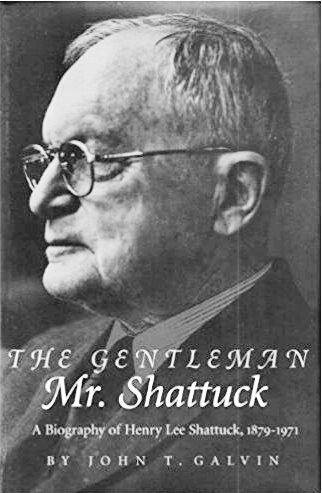
Henry Lee Shattuck: A Legacy of Humility and Generosity
- "The Man Who Said Little but Did Much."
By Thomas Keown
Special to the Boston Irish Reporter – March, 2008
The estimate is that more than 40 million Americans can trace their ancestry back to Ireland. Figures don’t tell us how many have made that pilgrimage ‘home’ to seek their stock, but, of those who have, few will ever pack the punch of "The Gentleman Mr. Shattuck." Today a quick glance through college catalogues coast-to-coast provides numerous possibilities for any student seeking to study Celtic history, literature, or art. From Massachusetts to California to Georgia, a student can select from bachelors to doctoral programs, and all matters in between. Just a little over a half century ago the same scholar’s options would have been their father’s bookshelf or grandparents’ kitchen table.
Henry Lee Shattuck was a long time member of the Charitable Irish Society and served as its Treasurer for twelve years. When he gave $51,400 to establish a chair for Celtic Studies at Harvard College in 1940 nobody knew why. In fact, barely anyone even knew that he had. Shattuck’s gift was made anonymously under the name of "a friend of the Charitable Irish Society" and announced on St. Patrick’s Day by Benedict Fitzgerald, the society’s retiring President, at its 203rd anniversary dinner at the Copley-Plaza Hotel.
Attendees with no idea of the "friend’s" identity greeted such largesse with a natural blend of delight and curiosity. But, to the handful who knew the secret benefactor, it was still rather mysterious. A Protestant, politician, lawyer, and Harvard College treasurer, Shattuck was as true blue a Yankee as you could find at a time when Irish Catholics and Boston Brahmins still shared little but their historical enmity.
The explanation tells the tale of a remarkable man and the vacation he took – and is an object lesson in humility. The story was told last month at a reception in Harvard’s Department of Celtic Studies.
Notwithstanding his Yankee blood and influence as a widely respected and longtime Bay State legislator, Shattuck, like many, discovered a single Irish branch in his family tree and set off to Ireland to see about them. Unlike many, he stopped off to visit with Irish President Douglas Hyde in Phoenix Park, later writing that, "He agreed with me that something more might be done to advantage… in bringing to the attention of the American public, Gaelic art, literature, and language." That was in 1938. Two years later something had been done.
"Henry Shattuck’s gift was motivated by three things," recalled Henry Lee, Shattuck’s cousin, a past president of the Society, and a guest speaker at the reception. "His love of Ireland, his love of Harvard, and his love of the Charitable Irish Society. He at once admonished Harvard to give more attention to Irish studies, and told the Irish community and the Charitable Irish Society that they should be proud of their heritage."
Today a slap-up dinner in the Copley Plaza costs about $125. In 1940 it was $5 and so, employing even the most imprecise mathematics, Mr. Shattuck’s gift was more than $1.25 million in today’s dollars. It was a bequest large enough to set the professorship on a solid footing and according to Tomas O’Cathasaigh, the current holder of the Shattuck chair, made possible the introduction to America of Irish studies as a discipline. "The state of Celtic Studies can be described as very healthy," says O’Cathasaigh. "The same could not be said in 1940 when Henry Shattuck made his gift."
Future students of the department, like John V. Kelleher, would become founding members of the Celtic Studies Association of North America and ensure that the discipline continues to “exercise regularly and eat well.”
Henry Lee said of his cousin, "Henry Shattuck was a very modest man. He said very little, so people waited for him to speak, and listened when he did. He was a very generous man who helped more people than we will ever know. And, we will never know because he never sought recognition.”
Reference:
Galvin, John T. The Gentleman Mr. Shattuck: a Biography of Henry Lee Shattuck, 1879-1971. Tontine Press, 1996
* * * *
Thomas Keown was the former Director of Communications at the Irish International Immigrant Center.